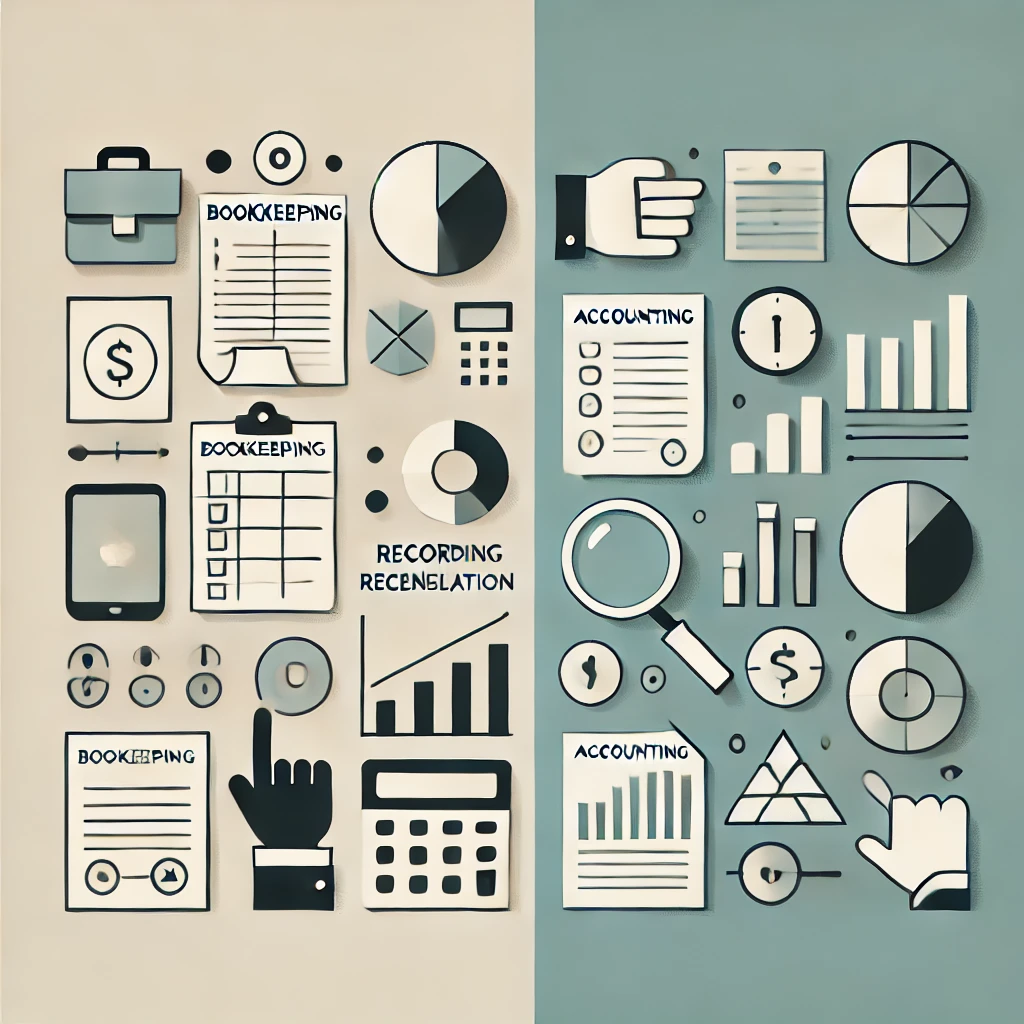Many people use the terms “bookkeeping” and “accounting” interchangeably, but they refer to different roles within a business’s financial management process. While both are essential for keeping accurate financial records, they each serve distinct functions. Bookkeeping is more about recording day-to-day financial transactions, while accounting involves analyzing, interpreting, and summarizing those transactions for decision-making purposes. In this article, we’ll dive into the differences between bookkeeping and accounting, explain the specific tasks involved in each, and explore how they work together to support business success.
The basics: what is bookkeeping?
Bookkeeping is the process of systematically recording all financial transactions that occur within a business. It’s the foundation of the entire accounting system, as it provides the raw data that accountants use to generate reports and insights. Bookkeepers focus on the daily, detailed financial activities of a business, ensuring that all income, expenses, and other financial transactions are accurately documented.
Key tasks in bookkeeping
Bookkeeping involves a range of important tasks, including:
Recording transactions
One of the primary responsibilities of a bookkeeper is to record every financial transaction that occurs within the business. This includes sales, purchases, payments, receipts, and any other financial activity. The bookkeeper ensures that these transactions are accurately entered into the business’s financial system.
Managing invoices
Bookkeepers often handle both accounts receivable and accounts payable, meaning they manage invoices sent to customers and payments made to suppliers. They track when payments are due and ensure that invoices are paid promptly to maintain good cash flow.
Reconciliation of accounts
Reconciliation is the process of comparing the business’s financial records with external records, such as bank statements or credit card statements, to ensure that everything matches. This helps identify any discrepancies, such as missing transactions or errors, which can then be corrected.
Maintaining the general ledger
The general ledger is the master document that contains all the financial data for a business. It lists every financial transaction in detail and is updated regularly by the bookkeeper. The general ledger is crucial for creating accurate financial reports.
Tracking income and expenses
Bookkeepers are responsible for categorizing income and expenses to ensure that everything is tracked correctly. This is essential for understanding the profitability of the business, as well as for preparing financial statements and tax filings.
The basics: what is accounting?
Accounting takes the raw financial data recorded by bookkeepers and analyzes, interprets, and summarizes it to provide insights into the financial health of a business. Accountants are responsible for preparing financial statements, offering strategic financial advice, and ensuring that the business complies with tax regulations and financial reporting standards.
Key tasks in accounting
Financial reporting
One of the primary functions of accounting is to prepare financial reports, such as the balance sheet, income statement, and cash flow statement. These reports provide a summary of the business’s financial performance over a specific period and are used by management, investors, and other stakeholders to make informed decisions.
Tax preparation and compliance
Accountants are responsible for ensuring that the business complies with local, state, and federal tax laws. They prepare and file tax returns, calculate tax liabilities, and help the business take advantage of tax deductions and credits. In addition, they ensure that all financial reporting follows generally accepted accounting principles (GAAP) or international financial reporting standards (IFRS).
Financial analysis
Beyond simply reporting on past transactions, accounting involves analyzing financial data to provide insights into the business’s performance. Accountants look at trends, ratios, and key financial metrics to offer recommendations for improving profitability, managing cash flow, or making investment decisions.
Budgeting and forecasting
Accountants also play a crucial role in helping businesses plan for the future. By creating budgets and financial forecasts, accountants help businesses allocate resources effectively, set financial goals, and anticipate future financial challenges.
Bookkeeping vs. accounting: key differences
While bookkeeping and accounting are closely related, they have distinct roles within a business’s financial management process. Here are some of the key differences between the two:
Focus and scope
Bookkeeping is primarily focused on recording daily transactions and keeping financial records organized. It involves documenting all income, expenses, and other financial activity in a systematic manner. Accounting, on the other hand, takes this recorded data and analyzes it to provide insights into the overall financial health of the business. Accountants focus on the bigger picture, using financial reports and data analysis to help with decision-making and strategic planning.
Role in decision-making
Bookkeepers provide the foundational data needed for accounting, but they are generally not involved in making financial decisions. Accountants, on the other hand, provide financial advice and insights that influence important business decisions. By analyzing financial data, accountants can help management make informed choices about budgeting, investments, and growth opportunities.
Skills and qualifications
Bookkeeping does not typically require a formal degree, though many bookkeepers pursue certifications, such as Certified Bookkeeper (CB) or Certified Public Bookkeeper (CPB), to demonstrate their expertise. Accounting, however, often requires higher qualifications, such as a bachelor’s degree in accounting, and many accountants go on to earn certifications like Certified Public Accountant (CPA) or Chartered Accountant (CA).
Reports and analysis
Bookkeepers are responsible for generating raw financial data, such as ledgers and journals, while accountants produce detailed financial reports, like balance sheets and income statements, and provide in-depth analysis of financial performance. Accountants interpret this data to identify trends, assess risks, and offer recommendations.
How bookkeeping and accounting work together
While bookkeeping and accounting serve different functions, they are both essential to a business’s financial management. Bookkeeping lays the foundation by recording daily transactions, and accounting builds on that foundation by analyzing the data to generate financial insights. Here’s how they complement each other:
Bookkeeping provides the raw data
Without accurate bookkeeping, accountants would not have the data they need to generate financial reports or perform analysis. Bookkeepers ensure that every financial transaction is documented in detail, creating a clear and comprehensive record of the business’s financial activities.
Accounting turns data into insights
Once bookkeepers have recorded the financial data, accountants use that data to prepare financial reports and analyze the business’s financial performance. They provide insights into profitability, cash flow, and financial stability, helping business owners and managers make informed decisions.
Technological tools for bookkeeping and accounting
Advances in technology have significantly streamlined both bookkeeping and accounting tasks, making it easier for businesses to manage their finances efficiently. Here are some tools commonly used by bookkeepers and accountants:
Bookkeeping software
Bookkeepers often use software like QuickBooks, FreshBooks, or Xero to automate the recording of financial transactions. These programs allow bookkeepers to track income, expenses, invoices, and more in real-time. They also make it easier to reconcile accounts and generate basic financial reports.
Accounting software
Accountants often use more robust accounting software, such as Sage, NetSuite, or Microsoft Dynamics, to perform in-depth financial analysis and generate comprehensive reports. These tools integrate with bookkeeping software to ensure that accountants have access to up-to-date financial data.
Cloud-based solutions
Cloud-based bookkeeping and accounting platforms allow businesses to access their financial data from anywhere, making collaboration between bookkeepers, accountants, and business owners easier. These platforms also ensure that financial data is backed up and secure.
When does a business need both a bookkeeper and an accountant?
Most businesses will need both bookkeeping and accounting services as they grow. Bookkeepers are essential for maintaining accurate financial records on a day-to-day basis, while accountants provide the strategic insights needed for long-term planning and decision-making. Here are some signs that your business may need both a bookkeeper and an accountant:
Growing complexity
As your business grows, your financial transactions will become more complex. At this stage, it’s essential to have both a bookkeeper to handle the day-to-day transactions and an accountant to ensure your business’s financial health is being analyzed regularly.
Tax planning and compliance
When tax season arrives, having both a bookkeeper to provide accurate records and an accountant to ensure compliance with tax regulations is crucial. Accountants can also help with tax planning, ensuring that your business minimizes its tax liabilities and takes advantage of all available deductions.
Financial decision-making
If you’re preparing to make major financial decisions, such as expanding your business, securing financing, or making a large investment, having an accountant to provide insights and advice is essential. Bookkeepers will ensure that all financial data is accurate, and accountants will use that data to help guide your decision-making process.
Conclusion
While bookkeeping and accounting may seem similar, they play distinct and complementary roles in a business’s financial management. Bookkeepers handle the day-to-day task of recording transactions, while accountants analyze and interpret this data to provide valuable insights into the financial health of a business. Together, they help businesses maintain accurate financial records, comply with tax regulations, and make informed financial decisions. Understanding the difference between these two functions is essential for any business owner looking to manage their finances effectively.
Frequently asked questions
What is the main difference between bookkeeping and accounting?
The main difference is in their focus. Bookkeeping involves recording day-to-day financial transactions like sales, purchases, and payments. Accounting, on the other hand, interprets and analyzes this financial data, preparing reports and providing insights to help with decision-making and long-term financial planning.
Do I need both a bookkeeper and an accountant for my small business?
It depends on the size and complexity of your business. If your business has a high volume of transactions or complex financial needs, it’s helpful to have both. A bookkeeper manages the daily financial tasks, while an accountant handles financial analysis, tax preparation, and strategic advice. Smaller businesses may combine these roles or outsource one of them.
Can bookkeeping and accounting be done using the same software?
Yes, many accounting software programs, like QuickBooks, Xero, and FreshBooks, offer tools for both bookkeeping and accounting tasks. These platforms allow bookkeepers to record transactions and for accountants to generate reports and analyze financial data from the same system, making it easier to maintain continuity.
What qualifications should I look for in a bookkeeper vs an accountant?
A bookkeeper typically doesn’t need a formal degree, but certifications like Certified Bookkeeper (CB) or Certified Public Bookkeeper (CPB) are valuable. Accountants, however, often hold a degree in accounting and may have advanced certifications like Certified Public Accountant (CPA) or Chartered Accountant (CA) to handle more complex financial tasks.
How do bookkeeping and accounting help with tax preparation?
Bookkeeping ensures that all financial transactions are accurately recorded throughout the year, which makes tax filing easier. Accountants take this information, prepare financial reports, and ensure tax compliance by filing returns, calculating tax liabilities, and finding eligible deductions or credits to minimize taxes.
What are the risks of not maintaining proper bookkeeping and accounting?
Poor bookkeeping and accounting can lead to inaccurate financial records, missed tax deadlines, and even legal issues. Without accurate data, business owners may struggle to track cash flow, manage expenses, or make informed financial decisions, potentially leading to financial instability or penalties from tax authorities.


